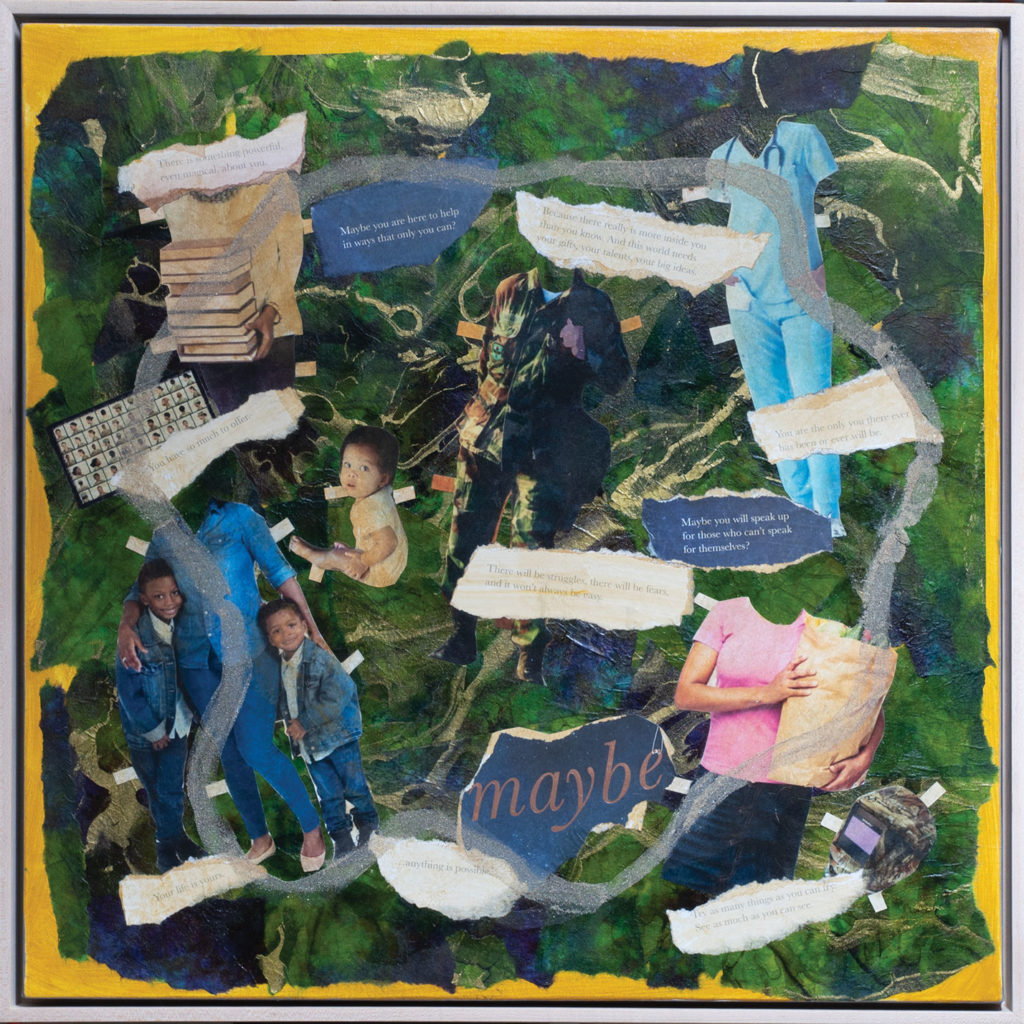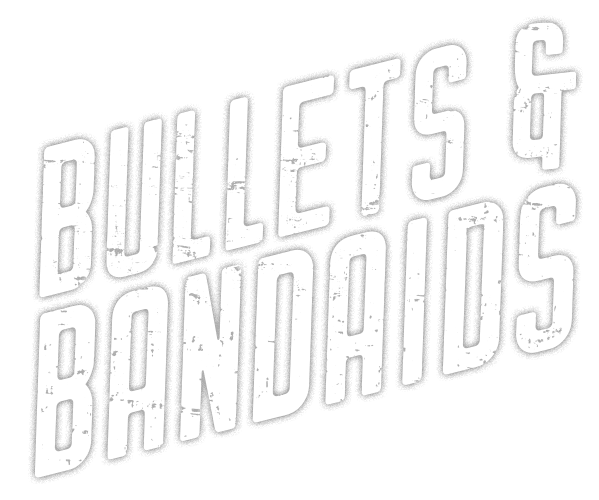
Mary Kamerer
24″ x 24″ • Mixed-media collage
Artist Statement
I found many personal connections to this subject and to my assigned veteran. It was an honor to bring this veteran’s military experience to the canvas. I decided to do a 24” x 24” mixed-media collage to honor Desert Storm Army veteran Jackie Holmes, who has taken on many roles in service to others.
The background is of handmade papers that resemble camouflage with a bit of gold.
Jackie had mentioned that she wanted to be a “tough G.I. Joe girl”, and that made me think about the equivalent of the G.I. Joe doll for girls. Of course, there isn’t one. Instead, many girls our age had paper tab dolls. I used that idea to encompass Ms. Holmes various careers—a teacher, nurse, mother, a community supporter and of course an Army soldier. Added are a few smaller elements from her story, like her young seven-month-old baby, the approved hairstyles for women soldiers, and the welding helmet that she was pressured to wear.
I also incorporated a favorite book of hers called “Maybe”. Those book pages were collaged into the artwork—the phrases are words of encouragement for someone finding their career path.
Finally, I added a ribboned path around the collage made of sand I brought back from Utah Beach in Normandy, France, where my own father came ashore during World War II. He, too, was a young Army soldier unsure of the path that lie ahead of him. The sand reminded me of Jackie’s role in Operation Desert Storm. That path of sand connects the images, to the words, to Jackie, to my father and to me.
Instagram: @maryckamererart
Facebook: Mary Kamerer Fine Art
by Kristine Hartvigsen
Very little about retired Master Sergeant Jacqueline Holmes’s military experience went as planned. In fact, she endured many system screw-ups and disappointments. However, she persevered with a strong determination to prevail and succeed.
In 1979, after three years as a nursing student at the University of South Carolina in Columbia, Holmes decided to change her major to education and turned to the military hoping to find financial resources for the additional time she would need to complete her degree. She never saw a dime in tuition money.
“They were concerned about those who were coming in as freshmen, they wanted new recruits, and I was, like, a junior. So, I was told that I wouldn’t be able to get any money.”
She enlisted anyway, and what followed was 10 years of service in the National Guard and 28 in the Army Reserve. Administrative errors and other curve balls commenced practically from day one.
“When I arrived at my duty station in Aberdeen Proving Ground, they said that I was slotted to be a welder. I told them there is no way I’m gonna spend my time doing welding. They said, we don’t have anything else that you can do. It was during the summer, and I only had, like maybe a month and a half to do what I needed to do and go back to Columbia to return to school in the fall. So the command sergeant major said, ‘The only thing I can offer at this point is small arms repair.’”
Holmes finished the self-paced small arms course in time to return for the fall semester at UofSC. Still, the welding MOS inexplicably followed her.
“When I came back to my duty station at Fort Jackson, regardless of what was in my paperwork, they told me I was a welder. They wanted me to weld some cages to store equipment, and they wanted me to go and obtain the gear and everything and suit up.”
She tried to tell those in charge that she knew nothing about welding, but they handed her a torch anyway.
“I told them, if you insist on me helping you put some cages together, I’m telling you now to clear the building!”
Fortunately, sounder minds prevailed, and Holmes never had to fire up the welding torch. Soon, she ended up doing the small arms MOS and started paperwork to get the MOS she actually wanted. For a while, she worked in administration and clerical support. She was in a medical MOS at the time she was called to deploy for Operation Desert Storm in 1990. Eventually Holmes found her way to what she wanted — human resources.
In concept, the Army was a good fit for Holmes.
“I had brothers, uncles and cousins who had served in the military, and I understood enough to know that if I had to do a part-time job, it would have to be a beneficial one. My mom gave us three choices after high school: Go to college. Go into the military. Or get a job. So I did all three.”
Holmes noted that there are old school and new school thoughts on career paths. In the past, people often worked their entire life for one company or entity.
“Today, the average 30-year-old has switched jobs 16 times. I always had a vision favoring longevity. I’ve always had that focus. I’ve always been one who believes that if you work hard enough, you can eventually have what you want in life. My parents instilled in us to go to work, pay your taxes, and do what you got to do.”
In 1990, Holmes and her husband were looking forward to celebrating Christmas with their two young children when orders came deploying her to Operation Desert Storm. At that time in her career, she had a medical MOS.
“We had a 7-month-old and a 7-year-old. I had no relatives or immediate family members nearby. My husband was an only child, so it was his mom who stepped up. Between the good Lord, my husband, and my mother-in-law, that was it. … Instead of doing Christmas, I was packing.”
Preparing to deploy was gut-wrenching. Holmes believes military mothers and their struggles are underrepresented in the media. She says she never sees stories in print or on television about military women having to leave their children. But it happens a lot. Despite the inner conflict, Holmes never considered any other way.
“I accepted the fact that I had to leave because I knew I’d put up my right hand and swore to serve my country.
Holmes’s older son had gone to live with her sister 84 miles away, leaving the baby, who has asthma, in the care of his father and grandmother. On days when he didn’t have to work, her husband traveled to visit the 7-year-old.
“He was a little bad boy. He realized that mama was gone far away, and that was his time to just really cut somersaults.”
After six months overseas, Holmes returned home to a very different family dynamic.
“It was terrible when I came back. My 7-month-old who was now 13 months, didn’t even know me. I had to allow him to continue to stay with my mother-in-law even after getting back home because he was more used to her than he was me. He had been walking, but he reverted back to crawling.”
Holmes says she never engaged in anything that risked her life or caused physical injury, but Post Traumatic Stress Disorder nonetheless was an occasional visitor.
“The PTSD part, I think, has been a combination of all the years in service and what I see going down right here in Newberry. We had four young guys, ages 15-18, who were all gunned down within hours of each other. Nobody really knew what happened. When I see that kind of stuff or read about it, it’s heartbreaking. A couple of them were pretty good in school and athletics. They were guys who probably could have gone into the military. There could have been a success story for them to tell somewhere in their life, but they never had the opportunity to carry it out.
After more than 30 years of teaching public school, Holmes retired in 2013. She continues to be involved in her community serving on the Newberry City Council
“I’m still seeking those things that involve people. I enjoy public service, I guess. I do food deliveries, activities in the park for the kids. I write a quarterly update in the local newspaper, and volunteer at the local food pantry in my district.”
As was her habit in the military, Holmes reads, does her research, and due diligence so she’s well prepared in her City Council role. She feels a strong responsibility toward the citizens and insists on being transparent and accountable.
“I’m constantly going to conferences. I just graduated from a four-month class that was hosted by U.S. Representative Jim Clyburn, I try to reach out to the constituents, and keep open eyes and ears in my district.”
Holmes never received tuition money for college but, in retrospect, feels everything worked out for her.
“I always figured if I did right and followed the path of the military, because I understood the benefits, everything would work out. I said, you know what? When I was thrown lemons, I made sweet lemonade. Five years into retirement, and I’m good.”
Holmes is happy to offer advice to those considering military service.
“I would say, do your research. Know the difference between the branches and decide which one you want. There are many unique differences among all of them. It’s really an individual choice. The military is very challenging. The military is very academic. … The military is hard, but I’d certainly encourage any young person to look at their options. They are well worth it.”
Holmes’s path was unpredictable and meandering, but she has no regrets about following her four brothers into the military. She smiles…
“I just always wanted to be, ya know, the tough GI Joe girl.”
